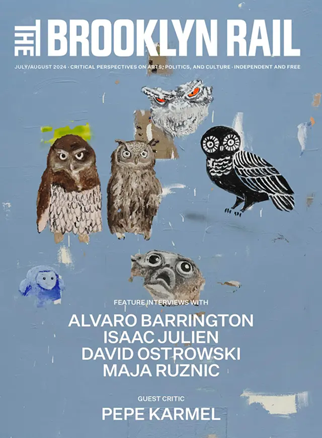The Poetics of Embodied Experience
An interview with Dr. Tremblay-McGaw about her recently published poems
By Clara Helm '25

While Dr. Robin Tremblay-McGaw is by no means new to the world of published poetry — with her 2015 book of poems, Dear Reader (Ithuriel's Spear), under her belt — she continues to impress with her efforts toward pushing poetry into new realms of imagination.
Robin recently had three poems published in the July/August issue of the The Brooklyn Rail ("I woke among…” “Precipice–" and "To host an acoustic body"), as well as five poems published in the October issue of Threefold Magazine ("we," "after Calamities by Renee Gladman," "Every image leaves the body," "Why are you weeping? For whom are you looking?," and "A woman sweats in bed").
A defining characteristic of Robin’s newly published poetry is its exploration of the body and corporeality. She traverses one of the most fundamental features of poetry – its artful and aesthetic rearrangement of experience’s scar on our lives.
"Experience is, as Sarah Ahmed writes, sensorial. We live an embodied existence," Robin says, acknowledging this focus of the body as principal.
This interest manifests in her poems through vivid imagery and themes like physicality and presence, with poems such as "Every image leaves the body" and "A woman sweats in bed."
Robin’s creative process is deeply personal and reflective — maintaining a daily journal has been a practice she embraced only in the past decade.
"My journals are a kind of garden I harvest from," she explains, using them to collect language, quotes, and inspiration. This method emphasizes her belief in the power of language and the intricate interplay between experience, reading and writing, and poetic expression.
In her recent works, Robin employs unique poetic techniques, including paragraph form, the dash, purposeful lowercase, and enjambment. For instance, her poem “Precipice,” published in The Brooklyn Rail, originated from a collaborative classroom exercise known as "exploding the poem," which she learned when working at Bard College.
After reading Emily Dickinson’s "I felt a Funeral, in my Brain," twice over, her students select a couple of impactful phrases to inspire their writing. Robin did this exercise with her students, selecting "I heard…" and "wrecked, solitary, here--" and from there she allowed the language to inform her own poetry and delved into themes of uncertainty and the often precarious human condition.
"My poem ["Precipice"] uses Dickinson's phrases as jumping off points; the periods and dashes explore my thinking about this language and the experience of radical precarity, of thinking about death, about the American emphasis on the individual, about the role of community, about being on the precipice and how the dash is a kind of precipice," Robin explains. This precipice, she notes, is even sharper and scarier in this post-election climate.
This interplay between teaching and creation exemplifies her collaborative spirit toward her students and her poetic craft.
Another poem, "Why are you weeping? For whom are you looking?" published in Threefold Magazine, drew inspiration from a reflective retreat sponsored by SCU where she engaged with the beauty of the natural world and the richness of being alone, but together with others. After revising her journal entries from this retreat, the poem emerged, inspired by Anthony Cortese’s (Director, Ignatian Spirituality) discussion of the garden and her own reflections of the ocean and surfers that occupied it.
For students interested in publishing their poetry or fiction, Robin offers sage advice: "Do your writing. Read a wide variety of writers, practice copying a technique you find compelling."
She emphasizes the importance of understanding the aesthetic interests of different literary magazines and encourages aspiring writers to submit work to journals that publish work you resonate with.
As she continues to explore the depths of poetics, Robin’s contributions to the literary world and her dedication to her students shine brightly. The English department is proud to celebrate her recent accomplishments and looks forward to her future endeavors in poetry and beyond.
Read Dr. Tremblay-MacGaw’s Brooklyn Rail poems:
https://brooklynrail.org/2024/07/poetry/Robin-Tremblay-McGaw/
Read Dr. Tremblay-MacGaw’s Threefold Magazine poems:
https://threefoldpress.org/robintremblaymcgaw